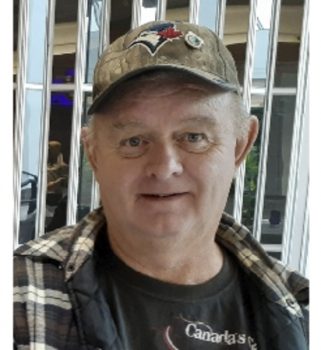In the past two and a half years since the pandemic began, 75 people from Grey and Bruce counties have lost their lives to COVID-19. For those of us fortunate enough to have escaped serious illness, the daily death counts here and across the country are anonymous statistics. Tight restrictions on public gatherings in the early days meant funerals and celebrations of life were cancelled, which only added to the struggle to put names and faces to the numbers. This is a story behind one of those statistics. Number One – the first man in Grey and Bruce to die of COVID-19, and his name was Vern Bowles.
Vern was born on the family farm in Markdale, and raised his family in Chatsworth. He owned his own logging company, and was married to his best friend of 39 years, Tish. Together, they raised three children, one of whom is Alisha, who works

at the Brightshores Owen Sound Hospital. Alisha agreed to talk about losing her Dad, and what it was like coming to work when her Dad was a patient.
Alisha spent close to a decade working for Community Living with people with special needs. When COVID hit, she was recruited to join Brightshores in a new position as a Personal Care Assistant (PSA) on unit 4-6, working with seniors with mental health challenges.
“I remember thinking – oh my god, I’m going to work in a hospital during a pandemic,” said Alisha. What have I done?” About six months into her new role, she woke up with a sore throat and called Occupational Health. “I thought I caught my family’s cold.” Alisha got a rapid test on New Year’s Eve, and the results came back in two hours.
“I was positive. I cried. Public Health called to say I was immediately in isolation for no less than ten days and that my close contacts needed to be tested and to go into isolation as well. Public Health said it’s a pandemic, you can do all the right things and still get sick. Later that day, my dad said he wasn’t feeling well, but he could not get tested until the New Year’s holiday was over, four days later. My dad, mom, sister, daughter and boyfriend all tested positive. I was re-tested, and I was still positive.”
After a few days, Alisha’s parents were showing more severe symptoms, and came to the Owen Sound ED. Tish was put on low oxygen, had a chest x-ray, and was allowed to go home. Vern was immediately put on oxygen, and rushed to the ICU.
“My dad’s chest x-ray looked like shattered glass. They said he had COVID-induced pneumonia.” Alisha said her Dad was able to interact with the nurses for the first week. “He had wonderful care. One of the nurses knew how much my Dad liked the Toronto Maple Leafs, and would gown up in full PPE just to tell my dad the score of the games. He loved the Leafs.”
Vern started to struggle. His blood oxygen levels were in trouble, and the early stage renal failure he had prior to COVID complicated his situation.
“I was working that day and heard a Code Blue over the PA system, and it was his room number. It didn’t register with me the extent of what had happened until my mom called the unit. My dad was going into oxygen-deprived delirium.”
Vern was quickly sedated, and put on a ventilator. Alisha, scared and devastated, left work to be with her family.
Alisha’s family was informed that her dad was in acute respiratory distress and in lung failure. The doctor informed Alisha that if her Dad survived, he would have significant deficits. The survival rate was not good, but there were still a lot of unknowns with COVID and the fight was not over.
Alisha was worried that her Dad would die, and that her mom wouldn’t get to say goodbye. “I called the on-call COVID line and explained the situation. They immediately called the CEO, and called me right back to say my mom, myself, and my sister could come.” Although visitor restrictions were in place throughout the pandemic, exceptions were made on compassionate grounds for those who were dying.
“We got into the ICU and as soon as we walked in we saw 7 IV bags and multiple poles coming out of his room. There were feeding tubes and catheter bags, and a ventilation machine, and a vitals machine and there were restraints on his bed. It was heart breaking seeing my Dad this way.” Due to the delirium, and prior to being put on the vent, Vern kept pulling his oxygen mask off, which is common for patients in his situation.
The next four days were difficult. Vern was proned multiple times to assist his damaged lungs. His kidney’s were shutting down. Alisha decided to register to be a kidney donor. If he did survive, he would need a kidney, and she would be ready.
After a week of being ventilated and proned, the doctors began weening Vern off the sedation to see how he would react, which was a gamble. He was showing some promising signs of appropriate brain function. But then the doctor called Alisha’s cell while she was at work. “He said I needed to go home and have a family meeting. Dad was too unwell to be air lifted to London. They couldn’t do a cat scan. The neurologist did assessments at the bedside to determine if there was brain activity. He was considered brain dead and in multiple organ failure.”
The family was told that Vern was unlikely to survive the night, and that they should come to say good bye. “My Dad never wanted to be left on a vent or in a vegetative state. Knowing my Dad’s wishes, my mom made the hardest decision of her life… to take him of the vent. He passed away five minutes later.”
It was Jan. 30th, 2021, 24 days after being admitted to hospital. Vern was 67 years-old.
Unbeknownst to the Bowles family at the time, all healthcare providers are obligated to report COVID deaths to Public Health. Before the family had a chance to tell extended family members, news of the region’s first death from COVID was picked up by local media.
Vern was listed as an anonymous statistic, but many extended family members were aware that Vern was in ICU with COVID. “I had people give me condolences before I had a chance to tell them.” Alisha couldn’t listen to news or the radio for about 3 months after that, as media reports kept referring to the man in his 60s who was first to die in this region, and it made her constantly question whether or not she was the person who gave him COVID. “Public Health said it could have been anyone, even one of us who had no symptoms, or he could have gotten it first and passed it to us. But I was the first one to test positive. That is a very heavy burden to bear – to think that I was the one – I am the reason he is not here.”
“I couldn’t be more grateful of those who I work with. My dad received exceptional care.” Although at one point the plan was to try and transfer Vern to London, Alisha said it was such a relief to have him in Owen Sound. “If he had been shipped to London they might never have let us in (to see him in ICU). Their COVID patient volumes were so high he wouldn’t have had the same care. He would have been another number.” Alisha welled up when she recalled the nurses who cared for her dad. “When we called (his room), the nurses would put the phone to his ear so we could chat with him.”
The family was very appreciative of Vern’s physician, Dr. Kuhl. “When he talked to us, there was such a re-assuring way about him. He wasn’t promising us the world, but he was proud when my dad was holding his own. Dr. Kuhl called us every day – it didn’t matter how late – to say how the evening went and what his plan was for the next day.”
With her family still reeling from Vern’s death, three weeks later Alisha returned to work, but as a healthcare worker on the front lines, there was no escaping the pandemic. Alisha was re-deployed temporarily to the Meaford Hospital to the Transition Unit, a unit set up to alleviate the bed pressures in the Owen Sound ICU from rising cases of COVID.
Alisha spoke about the things she remembers most about her Dad, and the things she misses.
“He was so loved. I remember going to Keady Market with him and I had to leave him at the fruit and veggies section because he was talking to so many people. I spent a good hour browsing, and when I came back he was still there talking! And the only time I ever saw him upset was when the Leafs were losing.
I’m just grateful he was my dad. It’s been over a year now and I am beginning to forget what his voice was like and that is heartbreaking. COVID robbed my Dad and my family of a life we could have had.”
